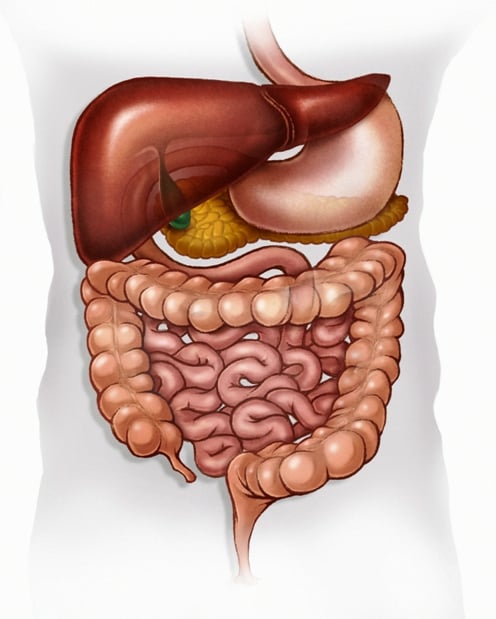Gastroenterology and Digestive Health
Request an Appointment
See a Provider
Related Care Providers
Find a Team
Related Care Locations
Find a Location
 Gastroenterologists at Crozer Health are trained in some of the latest technologies and procedures to diagnose, manage and treat gastrointestinal and digestive conditions.
Gastroenterologists at Crozer Health are trained in some of the latest technologies and procedures to diagnose, manage and treat gastrointestinal and digestive conditions.
We provide every patient with a consistent, compassionate and personalized approach to care that acknowledges and understands both the physical and emotional impact these medical problems can have on people.
Fast, flexible scheduling is available, including immediate appointments for some services and direct access scheduling of screening colonoscopies for appropriate patients.
Conditions We Treat
- Acid Reflux and Heartburn: Acid reflux happens when your lower esophageal sphincter (LES) is weak or relaxes, allowing acid to flow back into the esophagus and cause irritation.
- Alcohol-Induced Liver Disease: Alcohol-induced liver disease occurs in three stages of increasing severity: Fatty liver, alcoholic hepatitis and alcoholic cirrhosis.
- Celiac Disease: Celiac disease is a digestive disease that damages the small intestine because of particular sensitivity to a protein called gluten.
- Colon Polyps: A polyp, simply put, is an abnormal growth of tissue. The majority of colon polyps are benign, but some can turn into cancer.
- Colorectal Cancer: Colorectal cancer almost always starts with a small growth called a polyp. If the polyp is found early, doctors can remove it and stop colorectal cancer before it starts.
- Constipation: Constipation is when your stools are painful or they do not happen often enough. It is the most common gastrointestinal problem.
- Diverticulitis: Diverticulitis occurs when small, bulging sacs or pouches in the colon, known as diverticula, become inflamed or infected due to small pieces of undigested food or stool that get stuck inside.
- Gallstones: Gallstones are lumps of solid material that form in your gallbladder. They are made when the digestive juice called bile gets hard and stone-like.
- Gastroesophageal Reflux Disease (GERD): If acid reflux, and the heartburn it causes, becomes chronic, it can progress to GERD.
- Hemorrhoids: Hemorrhoids are when the veins or blood vessels in and around your anus and lower rectum become swollen and irritated. This happens when there is extra pressure on these veins.
- Hemochromatosis: Hemochromatosis is a hereditary metabolic disease that affects up to one million Americans. People with the disease accumulate too much iron in their blood and body.
- Hernia: A hernia is a protrusion of part of an organ through the muscle wall that surrounds it. Common hernias include hiatal hernias and inguinal hernia.
- Inflammatory Bowel Disease (IBD): IBD is a chronic or recurring inflammation of part or all of your gastrointestinal tract. The most common forms of IBD are ulcerative colitis and Crohn’s disease.
- Irritable Bowel Syndrome (IBS): IBS is a common disorder that affects the large intestine and causes uncomfortable symptoms such as cramping, abdominal pain, bloating, gas, diarrhea and constipation.
- Pancreatic Cancer: Pancreatic cancer is the fourth-leading cause of cancer death in the United States.
- Peptic Ulcers: An ulcer is an open sore, or lesion, usually found on the skin or mucous membrane areas of the body. An ulcer in the lining of the stomach or duodenum is referred to as a peptic ulcer.
Treatments and Services
Advanced Endoscopy
For those suffering from more complex disorders of the digestive tract, advanced endoscopic services are available to diagnose, evaluate and treat these disorders. Our gastroenterology team includes experts and specialists trained in minimally invasive, interventional and therapeutic endoscopy procedures that minimize risk and offer patients less invasive treatment options.
If you have been diagnosed with a disorder of the gastrointestinal (GI) tract, bile duct or pancreas, talk to your doctor about advanced endoscopy evaluation and treatment options.

